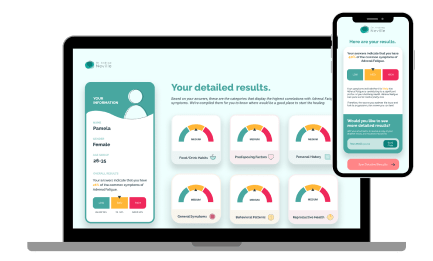Adrenal Fatigue Weight Gain Woes
If you’re suffering from a serious health issue, like Adrenal Fatigue, your weight problems may simply not be in your own hands. The more you chase weight loss, the more metabolic problems you will create.
Too many women ignore symptoms of Adrenal Fatigue. Thus they struggle in vain with weight gain and other health issues. Adrenal Fatigue weight loss woes must be dealt with at the root. Once the body is able to find its balance once again, weight loss can happen naturally.
Adrenal Dysfunction Leads to Weight Problems
There are several mechanisms by which Adrenal Fatigue or a stress response dysfunction can lead to weight problems.
The majority of these problems lead to weight gain. There is also a smaller percentage of patients who will lose weight and who have a hard time keeping weight on.
Common Reasons for Adrenal Fatigue Weight Gain
Adrenal Fatigue related weight gain can be understood by three simple issues:
1) The ability to convert food into a universal form of energy in the body (my definition of metabolism) is compromised.
2) The thyroid, the engine of your body, is suppressed.
3) Cortisol (the main adrenal stress hormone) makes you gain and hold onto fat.
Suppressed Metabolism Due to Adrenal Fatigue
Simply put, we are all designed to eat food, digest it, absorb it and convert the smaller bits into a universal form of energy (ATP). We then use this energy to make our body perform tasks like thinking, walking, breathing, and self-repair. Everything is dependent on this energy.
This metabolic process of converting this food into ATP is performed by your mitochondria. Eventually, overactive stress physiology significantly damages the mitochondria. The adrenals and thyroid work together to regulate this process.
Our metabolic process is compromised — in one way or another — when our body is in an active stress response. Sooner or later, this metabolic pattern remains when there is chronic stress; even when the stressors are removed.
Hypothyroidism Connected to Weight Gain
The thyroid is like the engine in your body. The stress hormone cortisol suppresses the thyroid at every level it can.
Your engine slowing down means everything slows down too. This leads to all hypothyroid symptoms such as:
- Fatigue
- Brain Fog
- Constipation
- Depression
- Excess Weight
And, it’s as simple as that.
This may make you want to crank up your engine; however, that would be a mistake. It’s important to take things slow and address the root cause of the thyroid issues and Adrenal Fatigue weight gain.
Balance the Adrenals to Balance Your Weight
The adrenals act as the oil and gas in your engine — the thyroid. If you crank up the engine without paying attention to the oil and gas, you will eventually cause trouble.
It may not be for a couple of months or even a couple of years, but that engine will eventually run out of oil and gas completely, leaving you to break down again.
A sustainable solution would be to treat the adrenal problem first. Fill up the oil and gas, and your engine — the thyroid — will likely kick back in on its own.
Chronic Stress Leads to Adrenal Fatigue
Over time, chronic stress can overwhelm the adrenal capacity for stress. The adrenal glands produces elevated stress hormones — like cortisol — during the initial stages of stress response and Adrenal Fatigue.
The cortisol is produced as an appropriate response to the fight or flight stimulation. During fight or flight, we would need fuel. And the major fuel of the body is glucose.
Eating food to provide glucose in an emergency situation would be too slow of a process. So, the body has developed a storage form of glucose called glycogen.
Cortisol stimulates the liver and fat cells to convert this glycogen back into glucose and release it into the bloodstream. This is when your body can use it as fuel to fight the proverbial tiger (i.e. dealing with your boss, traffic, social media, the news — you get the idea).
Weight Gain and Insulin Resistance
During a fight or flight situation, your body senses the elevation of glucose in the blood.
Insulin is then released by the pancreas in response to the elevated blood sugar, to assist in getting the glucose out of the blood. If there were an actual tiger to fight or to run from, you would burn off this excess blood sugar.
But if there is no actual tiger to deal with, the excess sugar in the blood can cause damage.
The primary mechanism insulin uses to lower blood sugar is to escort and open the door for the sugar to get into the individual cells.
However, if the cells already have adequate fuel or sugar, they will hold the door to the cell shut. The cells become “resistant” to insulin.
During insulin resistance, the pancreas produces increasing amounts of insulin to get the sugar out of the blood into the cells.
If the cells will not take in any glucose, the insulin then converts the glucose into a triglyceride: a molecule of fat plus sugar.
The body then stores the triglyceride as fat in the body for use at a later date. Typical storage sites for fat include the hips, thighs, and abdomen.
The Most Dangerous Fat Caused by Weight Gain
Fat in the abdomen is particularly sensitive to cortisol. It is the preferred target for the storage of triglycerides during stress. Increased deposits of triglyceride in abdominal fat lead to an increase in size of fat cells in the abdomen. This leads to increased belly fat.
Research shows that abdominal fat is the most dangerous location for fat deposition.
Insulin resistance is also called Metabolic Syndrome. This increases the risk for cardiovascular disease and diabetes. The pancreas has a limited capacity to produce insulin and can become “exhausted.” The exhausted pancreas cannot produce adequate amounts of insulin to handle the glucose in the blood. Blood sugar rises, because of limited insulin to manage it. This is the leading cause of diabetes.
Bottom Line on Weight Gain
Ultimately, there are only two ways to raise blood sugar and gain bodyweight
- overeating food (especially sugar and carbs)
- getting “stressed”
Stress will increase cortisol, and cortisol increases sugar.
How to Reverse Adrenal Fatigue Weight Gain Woes
Adrenal Fatigue involves several systems of your body. This is why it is important to give your body time to heal and turn off its overactive stress response.
Here’s the goal, in a nutshell:
- Get your cortisol back in line. Do this by dealing with your stressors, improving your resilience to stress, understanding how your body works, and working with it.
- Stop suppressing the engine of your body (thyroid) by staying stuck in a stress response. This requires rewiring your system so that it chooses calm over stress.
- Eat a hypoglycemic diet (or what I like to call a “Stress-Less Diet”). This keeps your sugar and carbs on the low side. If your weight doesn’t want to budge, you can look at your sugar and carb intake and cut it in half again. That usually does the trick.
The Next Step in Adrenal Fatigue Weight Gain
Over one-third of my Adrenal Fatigue patients state that their weight is one of their primary concerns. Healing Adrenal Fatigue effectively and regulating cortisol and stress are key factors in weight maintenance.





















